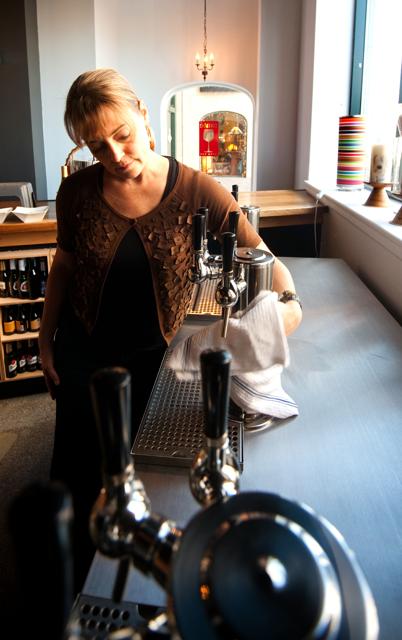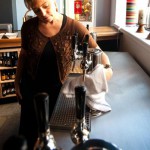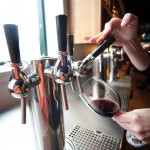- On tap: Carla Baden polishes her new wine tap system at Santé. Photos by Bill Rhodes
- I’d tap that: Not only does Santé have an innovative tap-wine system, the wine bar offers beer on tap, too.
Oxygen, along with extreme temperatures, vibration and sunlight, is the enemy of wine. One local oenophile’s big idea is fighting the good fight for fresher, “greener” wine and to stay on the forefront of her trade.
Carla Baden, the owner of Santé Wine Bar, closed for a renovation at the start of the new year, reopening less than a week later as a taproom — but not in the way you might think. Santé now boasts a gleaming, $10,000 stainless-steel wine kegerator, becoming the first wine bar in North Carolina to offer a “real” draft-wine system (she offers a small selection of beer on tap, too). The dual-zone machine (enabling reds and whites to be served at their ideal respective temperatures) sports 12 elegantly shaped tap faucets.
"It's sexy, right?" Baden says. "But it's all lipstick on the pig, so to speak. What’s inside is what's important."
From those gleaming taps, lines impermeable to oxygen run to pony kegs — six red, six white. "The gas [that pushes the wine through] is sort of what they use to push Guinness, a combination of nitrogen and CO2. Oxygen will never touch this wine," Baden says. "They've worked diligently on the technology side to make sure that what comes out of the keg is not affected, and that means a fresher product for my customers," she says.
So why keg wine? Wine Spectator reports that the growth of the popularity of wine on tap in the U.S. is "explosive," though Europeans have been doing it for eons.
Though tap wine seems to be catching on everywhere, it's primarily popular in larger cities among a younger generation of wine drinkers who are more likely to spend their money on "greener" products. And tap wine is greener wine; the kegs are reusable and eliminate the need for labels, corks and bottles. Each keg represents approximately 26 bottles of wine in a lighter package, reducing shipping costs and fuel consumption.
There are economic benefits to offering wine on tap, too. From a labor standpoint, filling a glass from a spout is quicker than opening bottle after bottle, meaning less bartenders can serve more people faster. Recyclable packaging, no corks or caps and no label artwork also mean less cost to the winemaker, a savings that gets passed on to the consumer. And with kegs, the waste from pouring out bottles that have been open too long is eliminated. "I hate pouring stuff down the drain, of course — I mean, who wants to do that?" Baden says.
The kegs need to be returned to the winemaker for refilling, says Baden, so Santé will initially pour mostly West Coast wines from their taps. "Getting the kegs back and forth from Europe, obviously, is a little bit more challenging," she says. A local distributor carries recyclable kegs from Austria, however. once you're done with the keg, you simply put it in a recycling bin.
Wines from other regions will still be available from the bottle at Santé, but the big deal is the new tap system, now flowing with a handful of quality new-world wines. It's all in the name of staying on the forefront of wine technology.
"This is a giant leap for me," she says. "As a small-business owner, I've had to borrow more money to make all this happen, of course. I've had to re-evaluate my commitment to Santé, to our wine program and to getting out there on the leading edge of how [wine] is done — and where it's going."





Before you comment
The comments section is here to provide a platform for civil dialogue on the issues we face together as a local community. Xpress is committed to offering this platform for all voices, but when the tone of the discussion gets nasty or strays off topic, we believe many people choose not to participate. Xpress editors are determined to moderate comments to ensure a constructive interchange is maintained. All comments judged not to be in keeping with the spirit of civil discourse will be removed and repeat violators will be banned. See here for our terms of service. Thank you for being part of this effort to promote respectful discussion.